Margarita Ivy (Marharyta Pliushch) / Маргарита Плющ (1998) is a Ukrainian artist born in Zaporizhzhia. She relocated to Prague in 2016 after completing grammar school in Zaporizhzhia. In 2019, she was admitted to UMPRUM (Academy of Arts, Architecture and Design in Prague) to the Studio of intermedia confrontation led by Jiří David and Milan Salák, which soon turned into the Studio of Fine Arts III headed by Michal Pěchouček and Dominik Gajarský. In 2024, she obtained a bachelor’s degree and now continues a master’s program in the same studio under new heads, Žil Julie Vostalová and Lucie Rosenfeldová. Margarita Ivy’s work has been presented in several solo exhibitions in Karpuchina Gallery, Window Gallery, NIKA Gallery in Prague or Telegraph Gallery in Olomouc and in group exhibitions as well, most recently as part of a project by the Ústí nad Labem House of Arts, Cvrlikat: Art from a Bird’s Eye View. In 2022, she and an experimental collective “washed” organized an interdisciplinary performance featuring fashion designers Tomáš Višňovský and Natalis Repkovská.
Margarita Ivy’s work deals with the impact of trauma and its generational transfer. She often builds on the oral accounts of her own family, her grandmother and mother in particular, their experiences of tragedy and war, but also made-up ghost stories. Margarita collects fragments of family memory and reconstructs their experiences of grief and struggle to survive. She transposes them into her works to deal with them and with the moment of death and finality. The contemplative objects raise questions that are not pleasant to tackle, despite the fact they are part of our reality.
VERONIKA SOUKUPOVÁ’S INTERVIEW WITH MARGARITA IVY, CONDUCTED VIA EMAIL, SEPTEMBER 2024
Veronika Soukupová: Where exactly are you from? What is happening in your hometown right now? Is your family with you in Prague? Under what circumstances did you come to Prague and why did you choose UMPRUM?
Margarita Ivy: I come from Zaporizhzhia, a city that’s at the frontline right now. The area including the city itself is constantly under constant Russian shelling. One of the most dangerous, key objects in the war is the Zaporizhzhia Nuclear Power Plant that is now under Russia’s control. My feeling is that most of my friends and people I knew left the city, while refugees from parts of Ukraine further to the east (Mariupol, Berdyansk) kept arriving. The last time I’ve been home was a year ago. Air raid sirens blared the whole time, the longest break lasted fifty minutes at the most. People are tired and don’t pay attention to sirens, some shops close during air strikes, but most remain open. Older people voluntarily stay at home, in the city, and often end up alone. Neighbors mostly stick together and visit each other. Unfortunately, sometimes elderly people die alone in locked apartments. I have witnessed this situation myself several times. The atmosphere in the city is a mix of longing for life and omnipresent fear – bombed-out buildings being rebuilt, iron anti-tank hedgehogs, darkness. Kyiv is noisy because of the power generators, while Zaporizhzhia is immersed in darkness and silence.
I came to Prague in 2016 after completing grammar school in Zaporizhzhia. My family was convinced I should study in Europe. There were several reasons. I was attracted by art academies and due to the annexation of Crimea and outbreak of war in the east, the prospects in Ukraine were grim. After one year from my relocation to Czechia, my family moved to Kyiv. My father found Kyiv safer, and my brother continued his studies in the city. This decision seemed logical to the whole family at the time. Sadly, Kiyv too, ceased to be safe after the Russian invasion in February 2022. My parents ran out of fuel somewhere south to Kyiv (they did not have enough to make it to western Ukraine at the time). The found refuge in the basement of a friend’s house. They hid from the attack along with ten adults, fifteen cats, two dogs and a ferret.
In the meantime, in Prague, my world was falling apart. Neither me nor my friends could eat or sleep. I kept checking the news and tried to stay in touch with my family. I would have preferred being with them in the basement to helplessly watching the war. After two weeks, they were determined to continue west. But if my parents held it all back in safety and tension, they have only started to experience the pain abroad. My brother wanted to return home at all costs, my parents were worried about the rest of our family and friends who remained in Ukraine. Mum began to mourn the life back home, from grandmother’s china to family photographs left in Kyiv and Zaporizhzhia. That is what the process of parting with the past life and native country looked like. They had to put up with the fact they werw starting from scratch again. They are currently in Vienna. My brother has been studying at a technical university, both my parents have been learning German and continue to work in the same field.
VS: How do you feel about Prague and the Czech Republic? Do you feel good here? Have you encountered any issues?
MI: The Czech Republic, and especially Prague, is my second home, and because of my feelings, I do not intend to analyze it. It’s what it is with all its pros and cons.
VS: How do you feel about UMPRUM and your studio? Why did you choose this studio specifically?
MI: I was admitted to UMPRUM in 2019 by Jiří David and Milan Salák, to Studio of Intermedia Confrontation which soon turned into the Studio of Fine Arts III led by Michal Pěchouček and Dominik Gajarský. Their style of teaching suited me completely – it was very fulfilling and inspiring. The studio worked as a collective and students collaborated often. The heads of the studio always treated us correctly and led by example. In difficult moments, I felt understanding and utmost support, even when I wouldn’t have expected it. It was a safe space. At the moment, the studio is undergoing a transformation. I remain open and have no expectations; above all, I want to stay among the people with the same values.
VS: Describe what you deal with in your artistic work, what are your thoughts in this context, what kind of approaches you employ in your projects. Feel free to elaborate.
MI: I focus on the themes of mortality, post-generational traumatization, childhood and childhood memories. Most recently, I created a short film called “ой ти кіт мій муркіт” (Oh, you’re my purring cat) (the film is currently available on this link). At the same time, the film completely explains my earlier work. It is a documentary fairytale, in which I explore my identity through memories of my grandmother and my “home”. As it naturally happens, memories are distorted, but real and fairytale-like at the same time.
My home, vivid impressions and traumatic experiences have always been my greatest source of inspiration. I often work with oral accounts, based on my grandmother’s and mother’s tales. In connection to my self-reflection, I was looking for an explanation as to why I have a constant need to grieve. The full-scale Russian invasion reaffirmed this feeling. In summer of 2021, I have begun to delve deeper into my grandmother’s history; I have analyzed the impact of trauma on her and consequently my way of perceiving the world. Our family never spoke about the tragedies. Grandma did not want to share tales of the war nor of the hunger that she endured. All I heard from her were only words spoken in passing. After dozens of conversations with my family and my grandmother’s remaining relatives, a new world opened itself up for me. Collecting pieces of family history and finding out how much grief my family experienced was terrifying. All the more because it’s happening again to the entire nation.
I am learning to recognize my heritage. In today’s wartime reality, I feel it’s vital to preserve this story in memory to prevent it from happening again. Stories and memories are being transformed into films, expositions or objects.
VS: Do you feel you need to become socially and politically engaged in connection with Ukraine? If so, in what form?
MI: Yes, definitely. Above all, I need to talk about our history and culture here, abroad, both in private and public interviews and through my own art. I’ve been trying to promote Ukrainian art both here and at home. I share updates on the current situation from reliable sources, primarily for foreign friends and acquaintances. I support cultural events such as Ukrainian film projections, debates, lectures and exhibitions.







